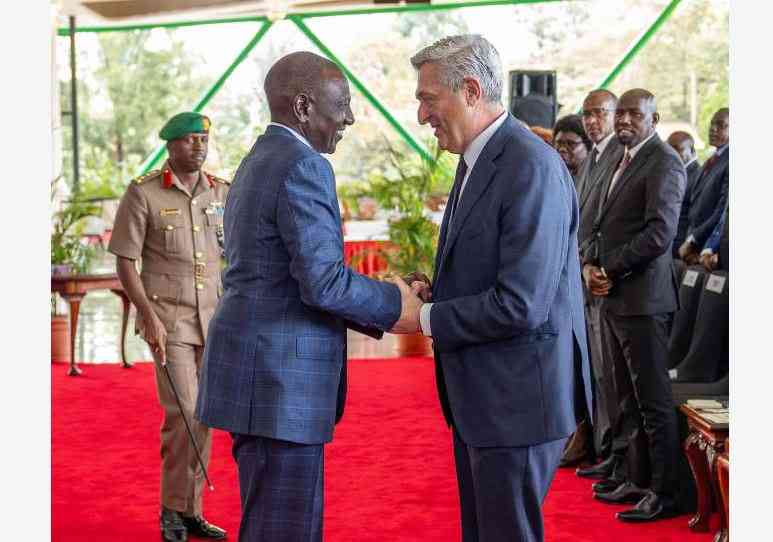Copyright asaaseradio

The Special Prosecutor, Kissi Agyebeng, has revealed that the Office of the Special Prosecutor’s (OSP) investigation into the Strategic Mobilisation Limited (SML) contracts has uncovered deep-seated irregularities, statutory breaches, and financial losses to the Republic of Ghana. Addressing a press conference at the OSP headquarters in Accra on Thursday, Agyebeng said the findings showed that there was no legitimate basis for contracting SML to perform its assigned functions. “The OSP investigation establishes the following. One, there was no genuine need for contracting SML for the obligations it purported to perform, and that the contracts were secured for SML through self-serving official patronage, sponsorship, and promotion based on false and unverified claims,” he said. He added that the contracts were attended by “egregious statutory breaches,” as mandatory prior approvals were “wantonly disregarded by relevant officials who acted with increased and emboldened impunity.” According to the Special Prosecutor, there was no established financial management system or monitoring mechanism to ensure value for money. Payments to SML, he said, were “set on automatic mode, detached from actual performance,” leading to significant financial loss to the state. Background to the investigation The OSP’s investigation traced the origins of the matter to 27 January 2017, when Kenneth Nana Yaw Ofori-Atta assumed office as Minister for Finance. Barely three weeks later, on 14 February 2017, a timber merchant named Evans Adusei incorporated a company called Strategic Mobilisation Entrepreneurship Limited (SMEL), the precursor to what later became SML. The company’s stated objectives at the time were “general trading and services” and the “import and export of general goods.” However, just four months after its incorporation, the Commissioner-General of the Ghana Revenue Authority (GRA), Emmanuel Kofi Nti, wrote to the Public Procurement Authority (PPA) seeking approval to engage SMEL through single-source procurement to provide an “enhanced classification, valuation, and risk management platform” for customs operations. Kissi Agyebeng explained that, at first glance, these developments, the appointment of the Finance Minister, the incorporation of SMEL, and the GRA’s application to sole-source the company appeared unrelated. However, the OSP’s investigation revealed a consistent pattern linking the three events. “A closer look at subsequent events from June 2017 to February 2024 shows a tightly knit and non-coincidental association of these prior identified events as the precursors of a masterful and mischievously crafted scheme,” he stated. He said the evidence suggested that the company’s introduction into Ghana’s revenue assurance system was the result of an orchestrated plan that continued throughout the tenure of the then Finance Minister. Findings of the OSP According to Agyebeng, the OSP established that the SML contracts were not only unnecessary but also procedurally flawed. “The company was incorporated for the sole purpose of employing it as a vehicle to ride on official patronage and sponsorship erected on false and contrived claims and attributes for the award of public procurement contracts in the revenue assurance setup,” he said. By December 2024, the company had received a total of US$1,436,249,828.53 in payments from the Republic. The OSP’s findings revealed that GRA’s first request to the PPA on 16 June 2017, which sought approval to single-source SMEL, described the company as having special interest and capacity in providing “effective and measurable solutions” to enhance government revenue. The request also claimed that SMEL had technological and financial backing from Cotecna SA, a multinational firm specialising in inspection and certification services. However, the OSP described the request as “irregular and perplexing,” noting that a company incorporated only four months earlier could not reasonably have the track record or expertise required for such an assignment. “It was simply unfathomable that a company which commenced business on 14 February 2017 would have attained the experience and track record that was advertised,” Agyebeng stated. The PPA rejected the request on 4 July 2017, stating that SMEL had “no proven experience in the business it sought to undertake,” and that there was no legally binding partnership between SMEL and Cotecna SA. Despite this rejection, the OSP found that the GRA, still under Mr Nti, submitted a second application on 1 August 2017, this time proposing a joint venture between SMEL and Ghana Link Network Services Ltd, with Cotecna SA still appearing in the background. This second application stated that SMEL had acquired a software platform for classification, valuation, and risk management from Cotecna and had agreed to partner with Ghana Link to provide verification and monitoring services. The OSP, however, determined that this application was “even more troubling,” as it clearly showed that SMEL still lacked the requisite experience and capacity. Mr Agyebeng described it as a “deliberate attempt to manipulate the procurement process, introduce a redundant private actor, and distort the facts to create a backdoor entry for SMEL into Ghana’s revenue assurance architecture.” When the PPA failed to respond to the second application, the GRA repeated it on 14 September 2017, but this too was rejected on 29 September 2017, with the PPA reaffirming that SMEL had still not demonstrated any capacity to perform the task. Legal and financial implications The OSP’s findings further revealed that the contracts violated several statutory provisions, including Section 179C of the Criminal Offences Act, 1960 (Act 29) which prohibits the use of public office for profit and Section 92(2b) of the Public Procurement Act, 2003 (Act 663), which forbids influencing procurement processes to obtain an unfair advantage. The report also cited “reckless decision-making and flagrant violations of statute” by key public officers, adding that successive Commissioners General of the GRA acted with “unquestioning compliance,” contributing to the financial losses incurred by the state. The Special Prosecutor stated that the SML contracts were built on false premises and executed in breach of the law. “The payment channels to SML were set on automatic mode, detached from actual performance, causing financial loss to the public,” he said. Kissi Agyebeng reaffirmed the OSP’s commitment to upholding integrity in public office and ensuring accountability through the enforcement of Ghana’s anti-corruption laws. Asaase Broadcasting Company airs on Asaase 99.5 Accra, Asaase 98.5 Kumasi, Asaase 99.7 Tamale, Asaase 100.3 Cape Coast, AsaasePa 107.3 (Accra). Affiliates: Bawku FM 101.5, Bead FM 99.9 (Bimbilla), Mining City Radio 89.5 (Tarkwa), Nandom FM 101.9, Nyatefe Radio 94.5 (Dzodze), Sissala Radio 96.3 (Tumu), Somuaa FM 89.9 (Gushegu), Stone City 90.7 (Ho) and Wale FM 106.9 (Walewale). Listen online: asaaseradio.com, Sound Garden and TuneIn. X: @asaaseradio995, @Asaase985ksi, @Asaase997tamale, @asaase1003, asaasepa1073 Instagram: asaaseradio99.5, asaase985ksi, asaase100.3, asaase99.7tamale, asaasepa107.3 LinkedIn: company/asaaseradio995. TikTok: @asaaseradio99.5 Facebook: asaase99.5, asaase985ksi, Asaase100.3, asaase99.7, AsaasePa107.3. YouTube: AsaaseRadioXtra. Join the conversation. Accra: call 020 000 9951/054 888 8995, WhatsApp 020 000 0995. Kumasi: call 059 415 7985 or call/WhatsApp 020 631 5260. Tamale: call/WhatsApp/SMS 053 554 6468. Cape Coast: call/WhatsApp 059 388 2652. #AsaaseRadio #TheVoiceofOurLand



